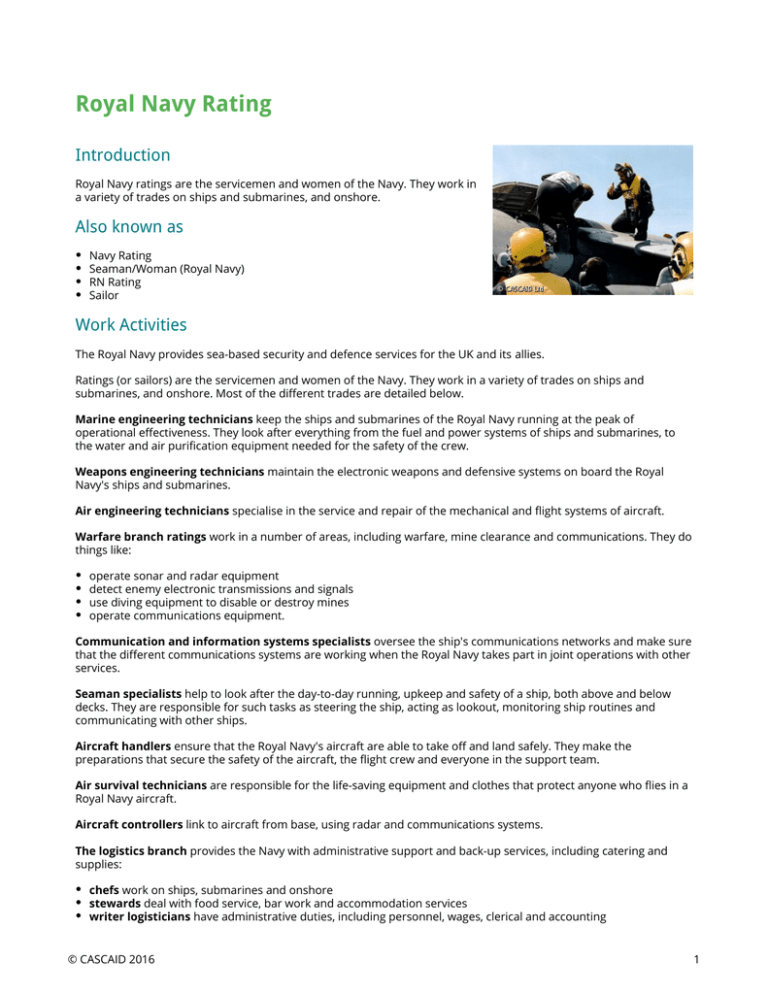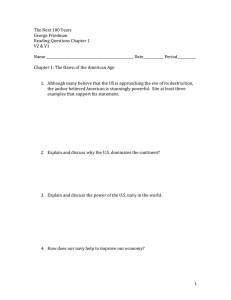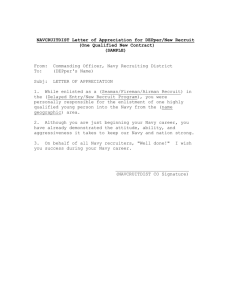Royal Navy Rating
advertisement

Royal Navy Rating Introduction Royal Navy ratings are the servicemen and women of the Navy. They work in a variety of trades on ships and submarines, and onshore. Also known as Navy Rating Seaman/Woman (Royal Navy) RN Rating Sailor Work Activities The Royal Navy provides sea-based security and defence services for the UK and its allies. Ratings (or sailors) are the servicemen and women of the Navy. They work in a variety of trades on ships and submarines, and onshore. Most of the different trades are detailed below. Marine engineering technicians keep the ships and submarines of the Royal Navy running at the peak of operational effectiveness. They look after everything from the fuel and power systems of ships and submarines, to the water and air purification equipment needed for the safety of the crew. Weapons engineering technicians maintain the electronic weapons and defensive systems on board the Royal Navy's ships and submarines. Air engineering technicians specialise in the service and repair of the mechanical and flight systems of aircraft. Warfare branch ratings work in a number of areas, including warfare, mine clearance and communications. They do things like: operate sonar and radar equipment detect enemy electronic transmissions and signals use diving equipment to disable or destroy mines operate communications equipment. Communication and information systems specialists oversee the ship's communications networks and make sure that the different communications systems are working when the Royal Navy takes part in joint operations with other services. Seaman specialists help to look after the day-to-day running, upkeep and safety of a ship, both above and below decks. They are responsible for such tasks as steering the ship, acting as lookout, monitoring ship routines and communicating with other ships. Aircraft handlers ensure that the Royal Navy's aircraft are able to take off and land safely. They make the preparations that secure the safety of the aircraft, the flight crew and everyone in the support team. Air survival technicians are responsible for the life-saving equipment and clothes that protect anyone who flies in a Royal Navy aircraft. Aircraft controllers link to aircraft from base, using radar and communications systems. The logistics branch provides the Navy with administrative support and back-up services, including catering and supplies: chefs work on ships, submarines and onshore stewards deal with food service, bar work and accommodation services writer logisticians have administrative duties, including personnel, wages, clerical and accounting © CASCAID 2016 1 supply chain logisticians order supplies, arrange for their safe delivery and keep records. Medical branch ratings provide a full range of health care services for Navy personnel and their families. They are based at sea and onshore. Medical assistants can specialise: in general service, with commandos, in submarines or in an operating department. Other medical trades include naval nurse and dental hygienist. Royal Navy ratings must be prepared to live and serve anywhere in the UK and overseas. They will sometimes have to work in difficult, dangerous (and sometimes life-threatening) conditions. Personal Qualities and Skills As a Royal Navy rating, you need to be: Physically fit. Determined. Cool-headed. Intelligent. Energetic. Flexible and adaptable. Prepared to travel and work unsocial hours. Prepared to take part in armed conflicts. You need to have: Stamina. Quick reactions. The ability to push yourself. A sense of responsibility. A readiness to obey orders. The ability to work as a member of a team. Onboard ship, and especially on submarines, you need to be tolerant, adaptable and able to live in close communities with colleagues. For some trades, your colour vision and/or hearing may be tested. Pay and Opportunities Pay The pay rates given below are approximate. The rate of pay for a rating on completion of training is around £17,515 a year. After this, pay rates vary, depending on specialism and length of service. Pay increases further with promotion. Hours of work Hours of work for Royal Navy ratings vary depending on operational requirements, but may include shifts, early starts, late finishes, weekend work and working on public holidays. As a Royal Navy rating, you may need to work at short notice, and you should expect to work longer hours during military exercises or on operational missions. Demand There are shortages in some roles. See the Royal Navy website for details. Where could I work? Royal Navy ratings serve in UK shore bases, or on board a ship or submarine at sea. Ratings can expect to be deployed anywhere in the world. This can mean extended periods spent away from home. © CASCAID 2016 2 Where are vacancies advertised? See the Royal Navy website for the latest recruitment information. Entry Routes and Training Entry routes To join the Royal Navy as a rating, you generally need to be aged between 16 and 36. Some trades have slightly different age limits so you should check the requirements for the role you are interested in. Almost all roles are open to both men and women. You must be no shorter than 151.5cm. You can speak to a careers adviser at your nearest armed forces careers office, or through live chat at: http://www.royalnavy.mod.uk/Careers/How-To-Join/Talk-to-Us There are various steps to go through before you can become a Royal Navy Rating: Application Recruitment Test (includes English,maths, problem-solving, and mechanics) Interview Medical and eye test Pre-joining fitness test If you are successful in getting through, the next step is to attend an induction course which introduces you to life in the Royal Navy. An Intermediate Level Apprenticeship is also a great place to start. Training As a new entrant, you will take a ten-week basic training course at HMS Raleigh, near Plymouth. You will complete a range of activities, including a first aid course, physical challenges and handling weapons. After basic training, you'll go on to specialist training for your role. Depending on the trade you choose, training can last from five weeks to four years. Progression You could move up the ranks to higher-level jobs; there are clear progression routes and opportunities for promotion. If you have the aptitude and ability, you could become a commissioned officer. Rehabilitation of Offenders Act Some careers in the Royal Navy are exceptions to the Rehabilitation of Offenders Act 1974. This means that you must supply information about any spent or unspent convictions, cautions, reprimands or warnings, if asked. This is different from other careers, where you only have to reveal information on unspent convictions if you are asked to. Qualifications For many jobs in the Royal Navy, there are no formal entry requirements. A number of specialist posts require you to have GCSEs at grades C and above. Some people choose to join the Royal Navy having already qualified, for example, as a nurse or radiographer. To get onto an Intermediate Level Apprenticeship, you’ll usually need at least 2 GCSEs at grade C or above, possibly including English and Maths. Check with the Royal Navy for full details. Adult Opportunities Age limits © CASCAID 2016 3 Age limits apply to this occupation. For most roles, entry is up to your 37th birthday. Further Information Contact your local Royal Navy and Royal Marines Careers Information Office/Armed Forces Careers Office. Contacts Skills for Justice Skills for justice, community safety, armed forces and legal services Address: Distington House, 26 Atlas Way, Sheffield S4 7QQ Tel: 0114 2611499 Email: info@sfjuk.com Website: www.sfjuk.com Ministry of Defence (MOD) Website: www.gov.uk/government/organisations/ministry-of-defence Marine Society & Sea Cadets (MSSC) Address: 202 Lambeth Road, London SE1 7JW Tel: 020 7654 7000 Email: info@ms-sc.org Website: www.ms-sc.org Sea Vision UK Email: enquiries@seavision.org.uk Website: www.seavision.org.uk Royal Navy Tel: 0845 6075555 Website: www.royalnavy.mod.uk/careers/royal-navy Careers Wales - Welsh Apprenticeships Tel: 0800 028 4844 Website: ams.careerswales.com/ Sea Cadets Whether at sea or on land, the Sea Cadets offers young people across the UK amazing opportunities for personal development - by learning new skills and working in teams - the Sea Cadets offer an environment where young people find new confidence and inspiration. Website: www.sea-cadets.org/ Related Careers RAF Airman/woman Army Serviceman/woman Royal Marines Commando Armed Forces Pilot Army Officer RAF Officer Royal Marines Officer Royal Navy Officer © CASCAID 2016 4

